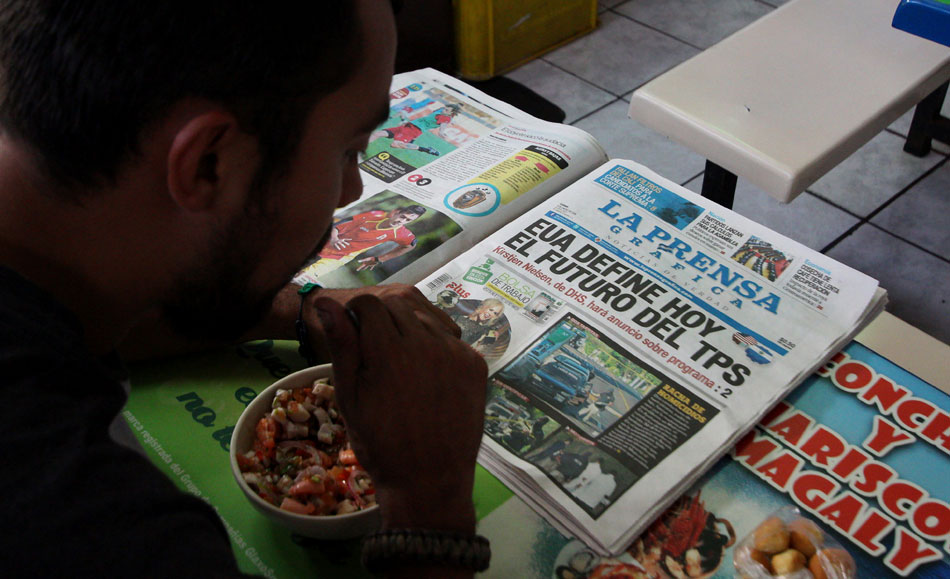
Salvadoran immigrants in the United States have just received an expected, but nevertheless traumatic blow from the xenophobic Trump administration. On Monday, January 8, the administration announced the end of Temporary Protected Status for about 195,000 Salvadorans. They must leave the U.S. by September 2019. Late last year, about 59,000 Haitians and about 2,500 Nicaraguans in the U.S. got the same bad news.
Temporary Protected Status (TPS) means that immigrants in the U.S. without other legal status are allowed to stay and work here because some natural or man-made disaster situation makes it anywhere from dangerous to impossible for them to return to their countries of birth. TPS was granted to Salvadorans in 2001 after a devastating earthquake, and has been regularly renewed ever since. In the case of the Nicaraguans it was Hurricane Mitch in 1999, and of the Haitians, the hugely destructive earthquake of January 2010.
During the Bush administration’s war in Iraq, then right-wing Salvadoran President Tony Saca sent a contingent of troops to the front, the only Latin American country to do so. Critics of Saca’s government, both in El Salvador and among the Salvadoran diaspora in the U.S., saw the granting and continuation (every 18 months) of TPS to Salvadorans in the U.S., and other aid to El Salvador, as “quid pro quo” for the Salvadoran troops in Iraq.
But the current government of El Salvador, headed by President Salvador Sánchez Cerén of the Farabundo Martí National Liberation Front (FMLN), is left wing and has bucked the U.S. on a number of questions. Most recently, for example, although El Salvador was absent and did not vote on the U.N. General Assembly Resolution condemning Donald Trump’s announced plan to move the U.S. embassy in Israel from Tel Aviv to Jerusalem, the Salvadoran government announced that it would keep its own embassy in Tel Aviv. El Salvador’s two neighbors, Honduras and Guatemala, both of which are governed by the right wing, voted with the U.S. and Israel against the resolution, and also announced that, like the U.S., they would likewise move their embassies.
The Trump administration does not, of course, say that it is canceling the Salvadoran immigrants’ TPS to punish President Sánchez Cerén’s government. Doubts about this are raised, however, by U.S. Ambassador to the U.N. Nikki Haley’s threatening statement that she would be “taking names” of countries that defy the U.S. on the embassy question and other matters.
The U.S. government claims that the situation in El Salvador has now reached a point where people can go back safely. It claims the same about the Haitians. But the sincerity of these claims is questionable, to say the least.
In the first place, that Salvadoran and Haitian immigrants can safely go back is not true, according to many sources. Currently El Salvador has a sky-high violence rate caused by the international drug trade and the activities of a number of “maras,” as criminal gangs are called in this part of the world. El Salvador, Guatemala and Honduras constitute the “Northern triangle” of Central American, all three of which have a shocking rate of deadly violence as well as high poverty levels. In El Salvador, the maras, which got their start in poor inner-city communities in the U.S., use force to make local residents pay them “protection” money and are especially known to force young women to become their leaders’ sex slaves. Thousands of unaccompanied minors and families have fled the region and crossed into the U.S. in the hopes of rejoining relatives here—relatives who, in many cases, have been living under TPS, or no protected status at all. Haiti continues to be the poorest country in the Western Hemisphere, and conditions there include many personal security problems as well.
A massive, years’ long drought in Central America has destroyed the agriculture-based livelihood of up to three million people in El Salvador, Guatemala and Honduras, adding to the pressure for family members to emigrate and seek work in the U.S., in order to send money to their relatives and communities in their homelands who have been left destitute. This is something that immigrants in the U.S. have always done, but the current level of these remittances is especially high: The poorer the country, the more important they are for national survival. In the first ten months of 2017, El Salvador, a country of only 6.3 million inhabitants, took in $4.5 billion in such remittances, a significant increase from previous years. This represents about 18 percent of the country’s Gross Domestic Product. The other countries of the region are recipients of proportionally similar amounts, with Haiti receiving $2.4 billion in 2016, or 30 percent of its Gross Domestic Product. Were it possible to deport all the TPS and undocumented immigrants from these countries, it would be a significant setback for all of their economies. Perversely, this would greatly increase pressure to emigrate, as well as destabilizing these struggling countries.
The economies of all the Central American countries except Panama and Belize are closely tied to the U.S. through CAFTA-DR, the Central American Free Trade Agreement, which also includes the Dominican Republic. CAFTA-DR is similar to the North American Free Trade Agreement, which joins the U.S. with Mexico and Canada. Like NAFTA, this agreement is the subject of many criticisms and disputes, but one effect is that residents of the area end up buying many U.S. products. This would be affected by such a mass, sudden deportation.
But it is likely that if the order ending TPS for Salvadorans and others is not reversed, many of the current beneficiaries of the program will not return to their countries of origin. They have put down roots here, marrying, having U.S. citizen children, and integrating themselves into the economic life of this country as workers and even as businesspeople and employers. Rather than let themselves be kicked out, with disastrous effects for their families both here and in their home countries, they will go “underground,” joining the 11 million undocumented immigrants who have no kind of protected status at all, except for those young people under DACA which Trump is also phasing out.
This will mean, among many other things, a loss of rights on the job as they are forced to accept even more precarious and unprotected work situations. Obviously, this will harm all workers in the U.S. and only benefit the worst kind of employers. Recent ICE raids on Seven-Eleven stores around the nation have netted undocumented workers there who will likely be deported.
So while rancorous debate continues on the subject of DACA, the fight to defend the Temporary Protected Status beneficiaries is being mounted also. Six important labor unions (UNITE HERE, Painters, Iron Workers, Bricklayers, SEIU and United Food and Commercial Workers) have banded together to defend the TPS workers. Also involved in this effort are many churches and civic groups, some grouped in a national coalition, the Save TPS Alliance, which has called for national demonstrations on February 4 and ongoing.
The immigrant communities and their allies, as well as the Salvadoran government, are hoping also for action in Congress. Currently, the Congressional focus is on the DACA recipients. Trump and selected Republican and Democratic leaders of both houses participated in a bizarre rambling meeting, much of it in front of the press and media, in which the president and the Republicans once more clearly showed that they see vulnerable immigrant populations as hostages, the ransom demanded being even more repressive, xenophobic anti-foreign policies. The price of doing anything at all for the DACA youth appears to be not only the famous wall on the Mexican border, but also an end to immigration from Africa via the visa lottery, and an end to immigration policies that emphasize unifying families.
At a meeting the following day, when the subject of TPS was broached, Trump was quoted in the press as referring to countries like Haiti and the African states, as well as El Salvador, as “shitholes.” He singled out Haiti as a country to whose inhabitants no concessions should be made.
So far, the Salvadoran government has been non-confrontational on this issue, actually thanking the United States for allowing such a long grace period for the Salvadoran recipients. It remains to be seen whether the “shithole” comment will affect this stance.












Comments